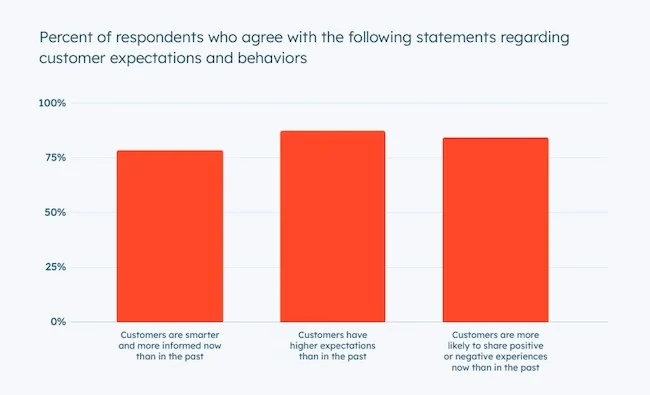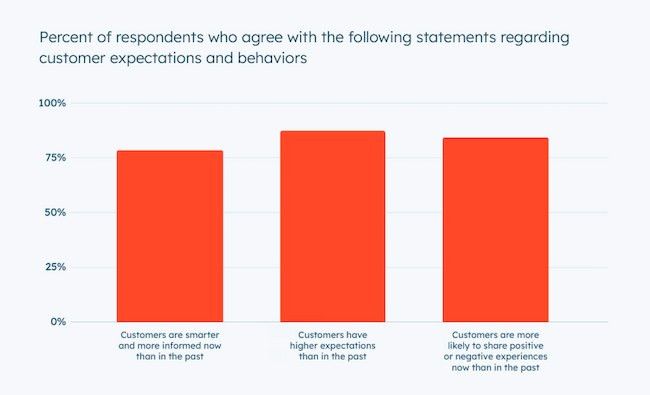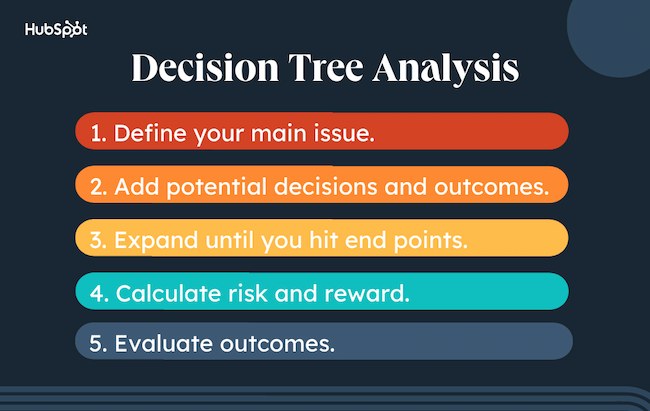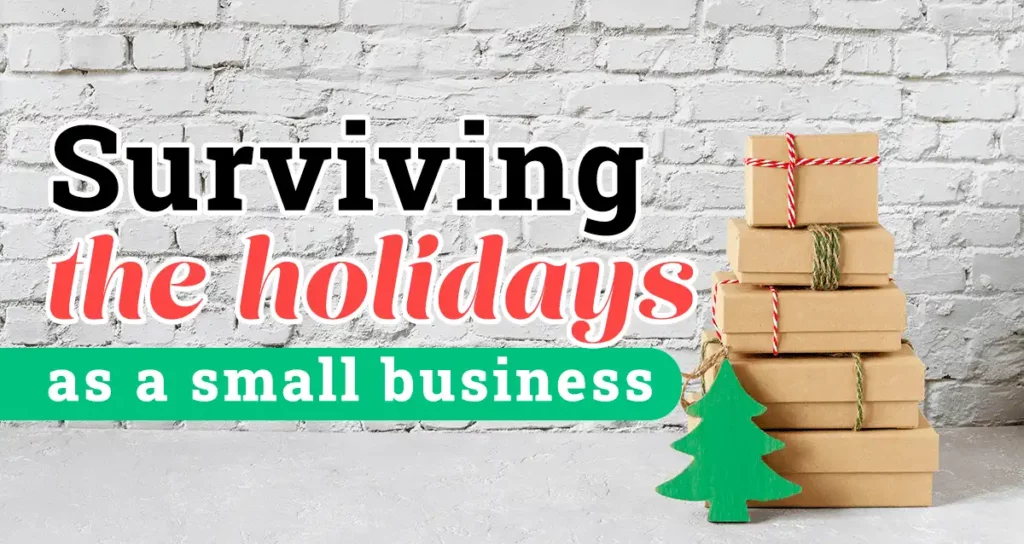What makes a business successful?

- Focus on the customer experience.
- A powerful business idea.
- Offering value to your target audience.
- Being flexible and quick to adapt.
- Bold decision-making and creative problem-solving.
- Paying attention.
- Getting out of the office.
The world is changing quickly, and so the strategies and habits that worked in the past don’t guarantee success today. You may be starting a business for the first time or working to pivot your company in a new direction. Either way, running a business today means staying open and taking in an ever-expanding flood of information.
The following steps will help you pay attention to the factors that matter most to business success.
1. Focus on the customer experience.
Customers and prospects have more access to information than ever before. According to HubSpot Research, 79% of customer service teams feel customers are more informed than they were in the past. And almost 90% of surveyed leaders say their expectations are higher than ever before.

In many situations, the way you treat your customers has more of an impact than your pricing or products.
Customer experience is the impression you give your customer. It tells them what your values are and how much you care about them. And this impacts their perception of your brand across each stage and touchpoint of the customer journey.
This means that businesses need to focus on every step of the buyer journey. You need to identify the problems on that path and offer new opportunities to create a great customer experience.
These are just a few ways you can build a customer focus:
- Make customer experience a priority by gathering insights from everyone on your team
- Take steps to reduce friction and focus energy on what’s most important to your customers
- Look at your product experience from their point of view
- Solve problems before they impact your audience
- Invest in training and supporting your customer service team
Customers want and expect a great experience from beginning to end, and they’re willing to pay a premium for it. Are you ready to provide that experience? Are you over-delivering on your CX? To run a successful business, you should be.
Featured resources:
2. A powerful business idea.
The oldest companies in the world have been around for as long as 1,400 years. But many companies struggle to last. In 2021 alone, over 14,000 businesses in the United States filed for bankruptcy.
Every business is born from an idea. Some ideas are riskier than others. Some ideas seem like a good plan at the time, but fizzle out over time. There are a few approaches you can take to find an idea that can make your business a success.
First, start with what you know. If you’ve ever had a hobby or job you’re passionate about, you know that every niche is more complex than it seems. As you learn more, you get a clearer picture of the joys and challenges below the surface.
For example, video games are more popular than ever. But a gamer playing Stardew Valley isn’t the same audience as someone who’s into Half-Life. Their different approaches to gaming mean that you’ll need to get more specific. This will help you find the problems you want to solve with your video game business idea.
Next, you’ll want to talk to your community. Whether it’s family and friends or an online group, it’s smart to test out the value of your ideas with a group of people. This step can help you refine your idea and figure out what the common objections might be.
Finally, research is essential before you launch your business idea. If you want to create a product or service that people are willing to pay for, it has to be unique, useful, and high-quality. That kind of idea may take some time to polish before it’s ready for purchase.
Featured resources:
3. Offering value to your target audience.
Customer value could come from your excellent business idea. But an idea isn’t enough to build a business. Honestly, it’s easy to come up with a great idea. What’s difficult is executing an idea so that it does what it’s meant to do, and does it well.
And no great product is ever finished. Many products will need constant updates from customer reviews and internal feedback to continue to offer value.
Even if your product or service is perfect, providing value doesn’t end there. The foundation of any successful business is trust. To develop that trust, you want to make sure your business goes above and beyond target audience expectations. But what does that mean?
First, it’s making sure that your product does exactly what you say it does. Don’t over-promise or sell functionality your product doesn’t have. Next, it’s about value throughout the customer experience, from support to instructions to your return policy. Value isn’t just the cost of making your product or what you ask in exchange for it. It’s customer perception, and how you meet those expectations.
For example, PopFlex doesn’t just offer inclusive athleisure wear, it runs a female fitness channel called Blogilates with journals, resources, and accessories to support its customers.

Featured resources:
4. Being flexible and quick to adapt.
Change is the only constant, and for your business to prosper, you’ll need to shift with the times. Whether you have to follow fashion trends or shift with regular tech updates, the ability to flex is essential.
And flexibility isn’t just useful when you’re adjusting your products or marketing. Employee expectations and needs will change. Customer communications will swing. It might feel more comfortable for you to stick with what you’re used to and ask other people to change instead. But that approach could limit your ability to succeed.
Adapting to change isn’t always easy. But greeting change with a positive and open attitude can improve productivity, loyalty, and engagement. It can also help your business act on new ideas early and give you a competitive advantage by doing so.
Flexibility and adaptability are soft skills, and if they don’t come naturally to you, you may need to go out of your way to practice them.
One way to stretch your flexibility is to travel somewhere new. The experience of adjusting to a different language and culture can make it easier to flex at home. Other ways to build your comfort with change include:
- Making constant learning a priority
- Keeping up with news and trends in your industry
- Expanding your network
Featured resources:
5. Bold decision-making and creative problem-solving.
Starting any business is a risk. But it’s rarely the only bold action you’ll take. More often than not, running a successful business means big decisions and creative experiments.
Dynamic thinking sounds wild and dicey when you’re talking about a company that supports you, your family, and your team. But it’s that creativity that creates a stable foundation for your business.
Because being creative is about finding where typical thinking has failed. It’s a chance to develop new ways of solving problems. Bold decisions don’t require any less planning or preparation than traditional ideas. They just take more faith, because there is usually little to no proof that these ideas will work. They might take more trial and error. But when a creative solution works, it really works.
If you don’t think of yourself as bold or creative, this aspect of business success may feel a bit daunting. But there are a few ways that anyone can use the creative process to improve their business decisions.

Begin with research, and try to quickly take in as much information as you can before you take action. Then, sit with the information for a little while. Consider the possible positive and negative impacts and don’t let the urgency of a deadline or external pressure rush a decision.
Creative decision-making is rarely a linear process. These tools can help when you’re feeling stuck:
6. Paying attention.
Running a business takes a lot of skill, effort, and time. When your batteries are running low, it’s tough to give your focus to the people and processes that need “extra” attention. But paying attention is what will help your business survive and thrive. It can give you vital insights you can use to grow your business over time.
For example, you want to pay attention to your customers’ changing needs. People are talking about you and your brand whether you ask them to or not. Are you listening and considering what they’re saying?
Your team might use traditional methods like calling or emailing your customers. You may also use the process of social listening or conduct feedback surveys, such as net promoter score (NPS), to gather data on customer sentiment. Make a habit of listening to the market and your customers.
Here’s a powerful example of a CEO who listened to feedback and applied it to grow his business. “As the founder of an indie startup, I’ve come to embrace a few core values,” says Eugene Woo, CEO of Venngage.
“This includes realizing our mission over a long period of time instead of a quick exit, creating value for our customers by helping them solve real problems, being responsible for our own financial sustainability, scaling at our own pace, and doing the right thing over ‘it’s just business.’ This philosophy has guided every aspect of my decision-making process as I’ve made Venngage into an independent, growing, and profitable business over the past four years.”
7. Getting out of the office.
“Entrepreneurs are the only people who will work 80 hours a week to avoid working 40 hours a week.” – Lori Greiner
Running a business can take over your life. But if you don’t take a break, you make it tough for your business to prosper. Stepping away from your office, store, or computer is essential to your continuing success.
Make time for social activities. Attend events, do some networking, or start a hobby that gets you out into the world. This can improve your energy levels and also help you expand your support system.
It’s also a good idea to take extra care of yourself. Try to get in some physical activity, travel, and take short breaks throughout the day to give yourself a rest or change of perspective. There’s a reason why airlines instruct us to place our oxygen masks on before helping others: if we don’t take care of ourselves, we can’t take care of someone else.
Likewise, if you don’t have personal goals and plans for your overall health and well-being, you won’t be as effective in running your business.






Responses